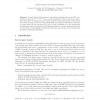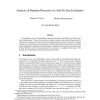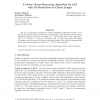58 search results - page 5 / 12 » Redundancy in Random SAT Formulas |
116
click to vote
SAT
2004
Springer
15 years 8 months ago
2004
Springer
Abstract. Recently Schuler [17] presented a randomized algorithm that solves SAT in expected time at most 2n(1−1/ log2(2m)) up to a polynomial factor, where n and m are, respecti...
102
click to vote
NIPS
2004
15 years 4 months ago
2004
Survey propagation is a powerful technique from statistical physics that has been applied to solve the 3-SAT problem both in principle and in practice. We give, using only probabi...
113
click to vote
APPROX
2004
Springer
15 years 8 months ago
2004
Springer
A simple first moment argument shows that in a randomly chosen k-SAT formula with m clauses over n boolean variables, the fraction of satisfiable clauses is 1−2−k +o(1) as m/...
142
Voted
SODA
1998
ACM
15 years 4 months ago
1998
ACM
We introduce a new set of probabilistic analysis tools based on the analysis of And-Or trees with random inputs. These tools provide a unifying, intuitive, and powerful framework ...
114
click to vote
JSAT
2006
15 years 2 months ago
2006
We give a randomized algorithm for testing satisfiability of Boolean formulas in conjunctive normal form with no restriction on clause length. This algorithm uses the clauseshorte...



